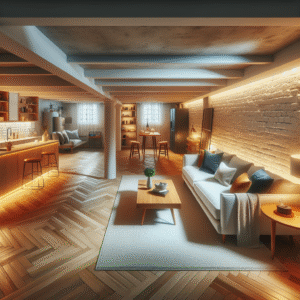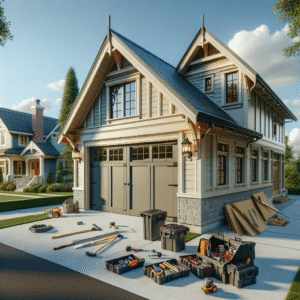Introduction to Roofing Shingles: Types and Benefits
Welcome to BuildNet, your premier resource for understanding the vast world of roofing shingles. Whether you’re upgrading your existing home, tackling a new build, or just curious about the latest in roofing technology, you’ll find invaluable insights right here. Roofing shingles not only protect your home from the elements but also boost its curb appeal and can significantly increase property value. In this guide, we’ll explore the various types of roofing shingles available and help you pinpoint which one might be the best fit for your home.
Exploring the Different Types of Roofing Shingles
Choosing the right roofing material is crucial for both the longevity and efficiency of your home. Let’s dive into the most popular types of shingles:
- Asphalt Shingles: Known for their cost-effectiveness and durability.
- Wooden Shingles: Offer a natural aesthetic and fantastic insulation properties.
- Metal Shingles: Boast longevity and resistance to severe weather.
- Slate Shingles: Known for their beauty and lifespan that can exceed 100 years.
- Solar Shingles: A modern solution that integrates solar technology into your roofing.
How to Choose the Right Type of Roofing Shingle for Your Home
Selecting the perfect shingle type goes beyond just aesthetics. Factors such as climate, roof design, and budget play pivotal roles in your decision. Stay tuned as we delve deeper into how to make these choices, ensuring your roof is as functional as it is beautiful.
Ready to learn more? Let’s get started on finding the ideal roofing shingles that align with your home’s needs and your personal style!

If you’re ready to take your home improvement or construction project to the next level, we can help! Find trusted contractors on BuildNet, whether you’re looking for renovations, new builds, electrical work, plumbing, or anything in between. Our directory connects you with qualified professionals who can make your vision a reality.
Introduction to Roofing Shingles: Types and Benefits
Welcome to the world of roofing shingles! Whether you’re building a new home, renovating an old one, or simply curious about your options, understanding the vast world of roofing materials is crucial. In this guide, we’ll explore the different types of roofing shingles available and delve into their unique benefits. By the end, you’ll have a solid grasp of why choosing the right shingles not only enhances the aesthetic appeal of your home but also plays a pivotal role in its protection and durability.
Why Choose Shingles for Your Roof?
Before diving into the types of shingles, let’s discuss why they are a popular choice for homeowners around the globe. Roofing shingles offer a variety of benefits that go beyond just protecting your home from the elements. Here are a few reasons why they might be the right choice for your roofing needs:
- Versatility: Shingles come in various materials and styles, each with its own set of colors and textures, allowing you to customize your roof’s look to match your home’s style.
- Cost-effectiveness: Many types of shingles are available at different price points, providing options for budget-conscious homeowners without compromising on quality.
- Durability: Depending on the material, some shingles can last from 20 years to a lifetime, making them a long-term investment for your home.
- Easy Installation and Maintenance: Shingles are generally easier to install and maintain compared to other roofing materials, which can reduce the overall cost of roofing over time.
- Energy Efficiency: Certain shingle materials can reflect sun rays and provide better insulation, helping to keep your home cooler in summer and warmer in winter, which can lower your energy bills.
While the benefits are clear, the choice of the right type of shingle can have a significant impact on achieving them. Let’s explore the different types of roofing shingles to help you make an informed decision.
Exploring the Different Types of Roofing Shingles
There’s a variety of shingle types each suited to different weather conditions, aesthetic preferences, and budgetary requirements. Here’s a closer look at some of the most popular types:
Asphalt Shingles
The most commonly used shingle type in North America, asphalt shingles are prized for their cost-effectiveness and wide range of styles. They consist of a fiberglass or organic mat coated with asphalt and topped with mineral granules. This structure provides good protection against the elements and is available in various colors and architectural styles, making them a versatile choice for many homes.
Wooden Shingles
For those looking for a more natural look, wooden shingles are a great choice. Typically made from cedar, redwood, or southern pine, these shingles offer a classic aesthetic that ages to a distinctive silvery gray. Wood shingles are also known for their natural ability to insulate better than asphalt.
Metal Shingles
Metal roofing has gained popularity due to its longevity, resistance to extreme weather, and fireproof qualities. Metal shingles provide the same benefits but with the appearance of traditional shingle materials like wood or slate. They are lightweight, recyclable, and can be quite energy-efficient.
Slate Shingles
If longevity is your top priority, slate shingles might be the perfect fit. Known for their natural appearance, strength, and durability, slate can outlast nearly any other roofing material. Slate roofs are heavy and require a strong structural support, but their lifespan of 100 years or more can make them a once-in-a-lifetime investment.
Solar Shingles
As technology advances, so do our roofing options. Solar shingles are a groundbreaking product that combines the performance of solar panels with the aesthetics of traditional roofing materials. They are designed to blend seamlessly with conventional shingles while generating renewable energy for your home. This option is perfect for homeowners looking to reduce their environmental impact and energy costs.
Choosing the right roofing material is crucial not only for the aesthetic appeal of your home but also for its long-term protection and efficiency. Understanding the different types of roofing shingles available and their benefits can help you make an informed decision that aligns with your home’s needs and your personal preferences. Be sure to consider factors like climate, your home’s structural integrity, aesthetic desires, and budget when selecting your roofing shingles.

Exploring the Different Types of Roofing Shingles
When it comes to choosing roofing materials for your home, the variety of options available can be both exciting and overwhelming. Roofing shingles are popular due to their cost-effectiveness, ease of installation, and aesthetic appeal. Let’s dive into the world of roofing shingles and explore the different types available on the market today. Understanding each type will help you make an informed decision tailored to your home’s needs and your personal preferences.
Asphalt Shingles
Asphalt shingles are by far the most popular type of roofing shingles used in homes across the globe. They are prized for their cost-effectiveness, durability, and ease of installation. Typically, they come in two varieties:
- Organic Asphalt Shingles: These are made of a paper base saturated with asphalt, making them waterproof. Though heavier and more prone to warping, they are also more flexible.
- Fiberglass Shingles: These are made with a fiberglass base layer and coated with a waterproof asphalt. The fiberglass makes them lighter and provides better fire protection than organic asphalt shingles.
Both types are available in a variety of colors and styles, allowing you to customize the look to fit your home’s aesthetic. Asphalt shingles typically last between 15 to 30 years, depending on the quality of the installation and maintenance.
Wooden Shingles
For those looking for a more natural appearance, wooden shingles are a fantastic choice. Made typically from cedar, redwood, or southern pine, wood shingles offer a timeless appeal and good insulation properties. However, they do require more maintenance than asphalt shingles to prevent decay, mold, and mildew. The lifespan of wooden shingles can be up to 30 years if properly maintained. They also provide a rustic, chic look that can significantly increase a home’s curb appeal.
Metal Shingles
Metal roofing shingles are known for their longevity, durability, and high resistance to harsh weather conditions. Made from materials like aluminum, copper, or steel, metal shingles can last up to 50 years or more with minimal maintenance. They are also an eco-friendly option as they are often made from recycled materials and can be recycled after their lifespan ends. Metal shingles reflect sunlight, helping keep homes cooler in warmer climates and reducing air conditioning costs.
Slate Shingles
Slate shingles are among the most durable roofing materials, with a lifespan that can exceed 100 years. Made from natural slate rock, they provide a distinctive and elegant appearance that can add significantly to the value of your home. Slate is fire-resistant and works well in wet climates, but it is heavier than other roofing materials and requires a sturdy structural support. It is also one of the more expensive options available, but its longevity and aesthetic appeal can make it a worthwhile investment.
Solar Shingles
Emerging as a game-changer in both the roofing and solar energy industries, solar shingles offer a way to integrate solar power generation directly into your roof. These shingles are designed to look like traditional roofing materials while harnessing the power of the sun to generate electricity for your home. They can be more expensive upfront than traditional shingles, but they provide the added benefit of reducing your electricity bills and increasing energy independence. Solar shingles typically come with a warranty of 20 to 25 years, though they can continue to function beyond this period at varying efficiencies.
Each type of roofing shingle offers unique benefits and considerations. When choosing the right shingles for your home, consider factors such as climate, your home’s structural capacity, aesthetic preferences, and budget. Whether you opt for the affordability and versatility of asphalt, the durability of metal, the natural beauty of wood, the longevity of slate, or the innovative technology of solar shingles, your choice will significantly impact the overall functionality and appeal of your home.
How to Choose the Right Type of Roofing Shingle for Your Home
Choosing the right roofing shingles for your home is more than just about aesthetics; it’s about protection, durability, and investment into your property’s value. With various options available, it can feel overwhelming to pick the perfect one. Here’s a friendly guide to help you navigate through your choices, ensuring you make an informed decision that suits both your needs and your home’s style.
Consider Your Home’s Architectural Style
Each home has its unique architectural design, which can be complemented by the right type of roofing shingle. For instance:
- Traditional homes might benefit from the classic look of wooden or slate shingles.
- Modern homes could enhance their appeal with metal or solar shingles.
- Cottage-style homes often look fantastic with the rustic charm of wooden shingles.
Matching the shingle style with your home’s architectural style not only boosts curb appeal but also maintains the integrity of its original design ethos.
Analyze Your Climate
The climate you live in plays a crucial role in selecting the right roofing material. Here’s how:
- Hot climates: Metal shingles or highly reflective shingles can help deflect sunlight and reduce cooling costs.
- Cold climates: Slate and asphalt shingles are beneficial for their durability and ability to withstand heavy snowfall.
- Areas prone to severe weather: Look for impact-resistant shingles if your home is in a region that faces frequent storms.
Choosing a roofing material that aligns with local weather conditions can lead to longer lifespan and fewer repairs.
Think About Durability and Maintenance
Some materials require more maintenance than others, and durability varies widely:
- Asphalt shingles are cost-effective and easy to replace, but they may not last as long as other materials.
- Metal shingles offer great durability and are low maintenance but can be more expensive upfront.
- Slate shingles are highly durable and can last decades, but they require a strong structural support due to their weight.
Consider how much time and resource you are willing to invest in maintenance when choosing your shingles.
Balance Cost With Quality
While it’s tempting to choose the least expensive option, balancing cost with quality can save you more in the long run:
- Investing in higher-quality materials might be more costly upfront but can provide better durability and less frequent replacements.
- Consider the long-term savings offered by more durable materials, especially if you plan to stay in your home for many years.
- Look for warranties and guarantees that come with higher-end shingles, adding value to your purchase.
Bear in mind that a good roofing material not only protects your home but also enhances its resale value.
Environmental Impact
For those environmentally conscious homeowners, consider:
- Recycled materials: Rubber and plastic shingles made from recycled materials are available and can be more eco-friendly.
- Solar shingles: These can help reduce your home’s carbon footprint and save on electricity bills.
- Energy efficiency: Energy Star-rated shingles can significantly decrease your home’s cooling costs.
Choosing environmentally friendly roofing materials can not only help the planet but also potentially give you tax credits and lowered utility bills.
Personal Preferences and Lifestyle
Your personal taste will also dictate your choice. If you prefer a rustic look, wooden shingles might be perfect. If you want a sleek, modern look, metal shingles might be better. Additionally, consider your lifestyle:
- If you travel often, a low-maintenance option like metal might be ideal.
- If you’re a homebody who enjoys occasional DIY projects, you might prefer a material that allows for easy repairs like asphalt.
Ultimately, the right roofing choice is one that fits your visual preference, lifestyle needs, and budget.

Frequently Asked Questions About Roofing Shingles
What are the main types of roofing shingles available?
There are several types of roofing shingles to choose from, each offering unique benefits. The most common types include asphalt shingles, wooden shingles, metal shingles, slate shingles, and innovative solar shingles. Each type varies in durability, cost, aesthetic appeal, and suitability for different climatic conditions.
Why are asphalt shingles so popular for roofing?
Asphalt shingles are favored for their cost-effectiveness, durability, and versatility. They come in various styles and colors, making them suitable for a wide range of home designs. Additionally, they provide a good balance of affordability and longevity, making them an ideal choice for many homeowners.
Can wooden shingles be used in any climate?
Wooden shingles are best suited for areas with a moderate climate. They are prone to damage from excessive moisture and can be susceptible to rot and mold in wet environments. However, with proper treatment and maintenance, wooden shingles can be adapted for less ideal conditions.
What are the advantages of metal shingles?
Metal shingles offer superior durability and longevity. They are highly resistant to extreme weather conditions like heavy snow, hail, and strong winds. Metal shingles are also fire-resistant and can help in reducing heating and cooling costs due to their reflective properties.
How long do slate shingles last compared to other types?
Slate shingles are often considered a premium roofing material due to their natural appearance and longevity. They can last over 100 years if properly maintained, far outlasting materials like asphalt and wood.
What makes solar shingles different from traditional roofing materials?
Solar shingles not only provide protection for your home but also generate electricity. They are designed to look like traditional shingles while harnessing solar energy. This can significantly reduce electricity costs and contribute to a home’s overall energy efficiency.
How do I choose the right type of roofing shingle for my home?
Choosing the right type of roofing shingle depends on several factors including your budget, the climate in your region, the durability needs, and your aesthetic preferences. It’s also important to consider the weight of the material and the structural integrity of your home.
Are there eco-friendly options for roofing shingles?
Yes, several eco-friendly options are available, such as recycled shingles or those made from sustainable materials. Solar shingles are also an excellent green choice as they reduce reliance on fossil fuel-generated electricity.
Can I install roofing shingles myself?
While DIY projects can be tempting, installing roofing shingles can be complex and hazardous. Professional installation ensures that your roof is installed correctly and safely, adhering to local building codes and manufacturer specifications.
Conclusion
In conclusion, choosing the right roofing shingles for your home involves understanding the different types available and how they match up with your specific needs. Whether you value durability, aesthetic appeal, or energy efficiency, there’s a shingle type out there that’s perfect for your home. Remember, while the initial choice and installation can seem daunting, selecting the right shingles is a decision that will protect your home and enhance its value for many years to come.
If you’re ready to take the next step, don’t hesitate to reach out for professional advice. On the BuildNet website, you can connect with experienced contractors who can provide you with a free quote and help you make the best choice for your home. Choosing the right contractor is just as crucial as selecting the right shingles; with BuildNet, you’re in good hands.







